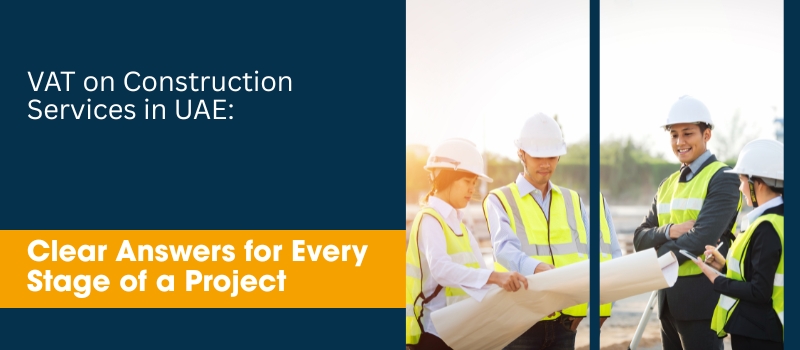Construction in the UAE moves fast. Projects rise, deadlines shift, and payments land in stages. Because of this, VAT on construction services in UAE needs the kind of clarity that helps builders, contractors, and developers stay fully aligned with the law. You get that clarity right here.
Let’s break it down in a way that any busy construction company can use without slowing down their project flow.
VAT on Construction Services in UAE at a Glance
The standard VAT rate is 5%. It applies to construction work linked to residential, commercial, and industrial buildings. This puts every contractor under the same set of construction VAT rules UAE, and that keeps the entire sector consistent.
Yet every project has layers. So real clarity comes from understanding how the rules work in action.
Date of Supply for Construction Projects
The date of supply is one of the core concepts in UAE VAT. It determines when VAT becomes due. For regular services, the date of supply is whichever comes first:
- The payment is received
- The service is completed
- A tax invoice is issued
Construction projects seldom follow a simple timeline. They usually involve phased delivery, periodic payments, and long completion cycles. Because of this structure, VAT for construction companies UAE often depends on periodic invoices or instalment-based payments.
If none of these events occur within 12 months of delivering the service, VAT gets triggered at the 12-month point. This rule helps avoid open-ended VAT liabilities in long-term contracts.
Snagging and Its Impact on VAT
Snagging covers the small defects found after handover. If the original contractor fixes them with no extra charge, nothing new gets added. So no new VAT applies.
If another contractor steps in, or if the original contractor adds a fee, then output VAT construction UAE applies again. Snagging then turns into a new taxable supply.
This part gets overlooked. It shouldn’t. Construction companies can stay fully aligned by keeping written notes of snag lists and repair responsibilities.
VAT Rules for Partially Completed Buildings
A building counts as complete when a qualified party certifies it. If it gets occupied before that point, the date of occupation takes the place of certification.
Now, if you sell a partially completed building, VAT on construction services in UAE applies at the standard rate. It drops only when the sale moves under a transfer of a going concern. This is rare, so companies need advice before assuming anything.
These details matter because construction cost VAT UAE changes with the building’s status, not just the sale.
Reverse Charge and Imported Construction Services
Many construction firms bring in foreign contractors or imported services. In these cases, the reverse charge mechanism construction UAE shifts the VAT duty to the local recipient.
This move helps the UAE track imported inputs with more accuracy. It also keeps VAT for contractors in UAE aligned with global construction flows.
Input VAT for Construction Companies
Contractors can claim input VAT on project costs that link directly to taxable supplies. Yet this calls for clean records. Projects often mix materials, subcontractors, and rented equipment. One break in the chain can block an input claim.
When companies apply the rules correctly, input VAT for construction companies lowers overall cost and keeps the project budget tight.
A Quick Guide for Builders and Contractors
To keep things sharp, here’s a clean summary you can use on any project:
- Track every invoice date
- Mark each certified stage
- Stay clear with retention timelines
- Log snagging tasks cleanly
- Check the building status before a sale
- Keep imported services under reverse charge
- Claim input VAT with airtight records
These points help you stay aligned with VAT rules for builders and contractors UAE.
Final Thoughts
The UAE VAT on construction sector aims to give every project a clear route from the first brick to the final handover. With this guide, you get a sharper view of the rules and a way to stay aligned without slowing down your build.
Elevate Accounting & Auditing steps in with clear guidance, proper filings, and full support for every stage of your project. Our team keeps your VAT records tight, your compliance smooth, and your financials ready for any review.
Talk to us whenever you want a partner that works with clarity, swiftness, and zero confusion.
FREQUENTLY ASKED QUESTIONS
-
How does VAT apply to construction services in the UAE?
VAT is charged at 5% under standard VAT implementation rules. Construction firms often rely on teams like Elevate Accounting & Auditing to keep VAT returns filing accurate and on time.
-
When should VAT be charged in long construction projects?
VAT applies at payment, completion, or invoice. Because timelines vary, many businesses work with Elevate Accounting & Auditing to manage clean VAT returns filing across each billing cycle.
-
Are retention payments subject to VAT?
Yes. VAT becomes due on payment, invoicing, or after 12 months. Elevate Accounting & Auditing helps record these entries correctly, which is especially useful during VAT deregistration.
-
Does snagging work trigger VAT?
If it’s part of the original contract, no. Extra work or a new contractor attracts VAT. We guide contractors on proper VAT implementation for all such scenarios.
-
What type of VAT support do construction companies usually need?
Construction firms often need VAT training, VAT implementation support, VAT returns filing, and advice on VAT deregistration as projects move from start to handover. Elevate offers all of this in one place.

